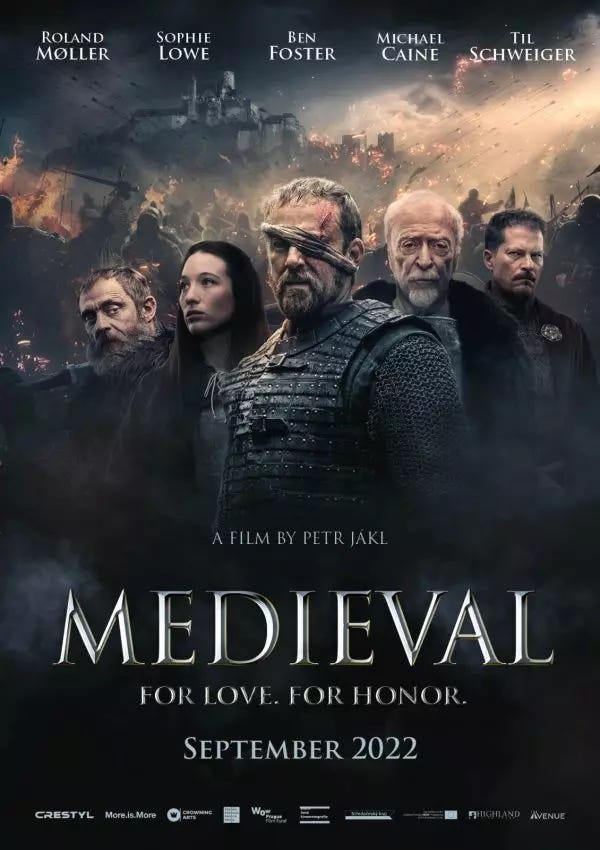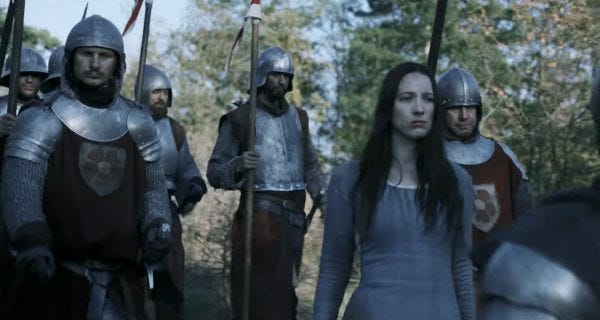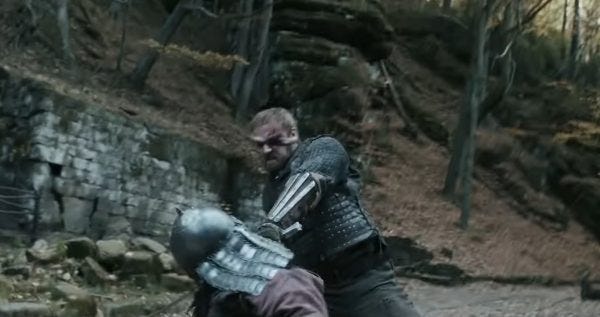Medieval:
A Review
Medieval: A Review
Medieval, 2022.
Written and Directed by Petr Jákl.
Starring:
Ben Foster, Sophie Lowe,
Til Schweiger, Matthew Goode, Roland Møller,
Michael Caine, William Moseley, Karel Roden,
Jan Budař, Marek Vašut, Ondřej Vetchý,
Vinzenz Kiefer, Magnus Samuelsson, Werner Daehn, Jennifer Armour,
Sean Connor Renwick, Roman Šebrle, Alistair Brammer, David Bowles,
Christopher Rygh, Guy Roberts, Martin Kavan, Viktor Krištof, Filip Antonio,
Aneta Kernová, Romana Jákl Vítová, Denisa Pfauserová, Kevin Bernhardt, Zhang Lang, and Václav Jiráček.
SYNOPSIS:
The story of fifteenth-century Czech icon and warlord Jan Zizka, who defeated armies of the Teutonic Order and the Holy Roman Empire.
This was not what I was expecting, having watched literally hundreds of movies, claiming to provide a historical backdrop, while maintaining a semblance of truth, storytelling, and believable actors; not to mention action scenes.
Medieval, was one that delivered.
This is a story, with sub-plots woven throughout, as well as a Hero’s Journey, depicting the early years of Jan Žižka, the future leader of the Hussite army.1
Žižka grew up at the court of the German king Wenceslas (King Wenceslas of Bohemia). After spending most of his life as a mercenary for the Poles, and fighting with them at the Battle of Grunwald (Tannenberg 1410), he returned to Bohemia and became a follower of the religious reformer Jan Hus. When Wenceslas died in 1419, his half-brother Sigismund attempted to ascend the Bohemian throne, but the Bohemians, aware that Sigismund would try to suppress Hussitism, organized a resistance.
Žižka became a leader of the Taborites, one of the newly formed peasant military communities (Fyrdung in German) that, with their tight discipline, religious and nationalist zeal, were vastly superior to the undisciplined feudal levies. that they opposed.
Ben Foster (Jan Žižka), who I recognized in the first scene, was not what I had in mind, as his role in the The Mechanic, Hell or High Water, 3:10 To Yuma, and many others, showed him as young, and somewhat a newcomer – he has matured, and from the first scene, set the stage with a new masculinity and, in this modern age, a masculinity much needed in theater, as well as real life.
The female character, Sophie Lowe, was perfect, and her mannerisms, even the inflection of her body language, was believable. They are the burgeoning love interest...with a twist.
Michael Caine, for his part, carried the underlying sub-plots with alacrity, and a presence, even at his age, which brings the entire movie together.
To date, this has been the most expensive Czech film, ever made, and taken from a story by Petr Jákl’s father, Kevin Bernhardt, with Petr Bok, based on historical knowledge from Marek Dobes, and Michal Petrus. Many think, that with a brain trust like this, that a Czech lead, would be a shoe-in but, in my opinion, Ben Foster was a crucial, and worthy, choice.
Foster, from the first scene, shows a warrior’s spirit, if tempered with a devout faith, not in the Church, but in spite of it – and puts the audience on notice, that this man, killer though he is, has a deep reverence for God.
There is a steady movement, as the film progresses, which shows the creation of men, in the name of god, which they call the ‘church’, either of France, or Italy, which motivates the characters, to the chagrin, and detriment of the many local citizens who, simply, want to live out their lives. Jan’s brother, living with his son, tries to stay out of the messy, and dangerous plays of the feudal lords, as well as Kings. Sadly, this is not to be.
The film is very authentic, and stays true to the pleasant savagery of the time period. Wardrobes, battle armor, plus shots in the Czech Republic, are stunning. The only thing that threw me, even though I figured it was to set the ‘character’ of these medieval times, was the Photography, and was a little ‘washed out’ to me, being filmed in monochrome, even from Jesper Tøffner, took a moment to get into the mindset, which this photography produces
The Cinematography, however, is exceptional, and pays dividends in the battle scenes.
There is ongoing war, so other half of Medieval involves political counter points, with nobleman Rosenberg (Til Schweiger) taking over various lands, clapping back against a rather unsuccessful Holy Roman Empire reign by Wenceslaus IV. Jan Žižka is pulled into this maze, by kidnapping Rosenberg’s fiancé (Sophie Lowe), which seems to be the only way to move the central players apart from each other, as the fiancé is the niece to the King of France who, as well, has a part to play.
This is, essentially, a counter-culture film, with the protagonist, acting as a Robin Hood, or Arminius – perhaps better to describe this character as being the best of both.
Naturally, Rosenberg strikes back, ordering the deaths of some family members of Jan Žižka, escalating this into a personal feud. Over time, Jan Žižka and his mercenaries team up with a band of rebels looking to push back against the terror, which was once a kingdom. These atrocities puts voice to Katherine, who starts out as high-born, but shows her mettle in ways, even the men are in admiration.
Ben Foster’s performance, the historical plot and period, is intense and, for me, very believable; the counterpoint with Sophie Lowe, while not historical, was an excellent fusion of old world masculinity, and the strength of true femininity, of the European evolution.
Medieval is about folk-heroes, not often cut from the cloth of errant nobility, but of the common man, the man who has blood on his hands – precisely the type of man to win wars, and revolutions.
Honestly, take your Sons, to see this, helping them through a fascinating look at our European history.
Rating: 8.5/10
_______________
1 Jan, Count Žižka, (born c. 1376—died Oct. 11, 1424, Přibyslav, Bohemia [now in Czech Republic]), military commander and national hero of Bohemia who led the victorious Hussite armies against the German king Sigismund, and was the precursor of the revolution in military tactics, two centuries later, with his creation of mobile artillery, in which he mounted on rudimentary wagons.






